Share

Financial Planning For Canadian Business Owners
Islamic Finance with Mohamad Sawwaf | E080
Ep. 80
•
Today, Islamic finance and the challenges it brings to people who follow that faith, particularly business owners, and how those restrictions around Islamic finances can be adapted to many of our current financial structures that are not supportive of it. But there are options, and to discuss that, we have Mohamad Sawwaf, co-founder of a company called Manzil.
Episode Highlights:
- 02.00: Islamic finance is finance before interest, and that is the difference in terms of what we see today. Islamic finance’s main principle is that money has no value, says Sawwaf.
- 04.25: Jason says that as a Muslim, you can’t borrow, and that is incredibly restrictive from a business owner’s standpoint. He asks, about the other means for accessing capital to buy homes or even start your own business?
- 12.21: Mohammad says that they are starting to see a real growth spurt in the Islamic Fintech space regarding innovative solutions, especially in the digital area that allows financial transactions to be much more simplified and accessible.
- 13.32: When you consider diversifying your investments as a Muslim investor, especially when it comes to the fixed income market, Islamic bonds are available, and they are called Sukuk, says Sawwaf.
- 15.37: Jason asks what does that look like if any Muslim in Canada, looking for a new business or building a manufacturing plant and wants to do things in a Halala method?
- 22.51: Today’s people are renting and avoiding homeownership because they want to sleep at night peacefully, knowing that their financial affairs are in order from an Islamic perspective, says Sawwaf
- 26.24: Federally, all meat out of New Zealand and Australia are halal because they export more than they consume and export to neighboring countries like Malaysia, Indonesia, and Singapore that require, says Sawwaf.
- 29.08: When you are trying to diversify an economy, and if you want to stick with primary industries, you have to create some specialties, says Sawwaf.
- 31.24: As per Sawwaf, nothing stops us from creating product industries except the capital required to bring it out into the open. There is no shortage of demand for anything.
3 Key Points:
- Sawwaf says that for inventory financing, as long as there is the element of shared risk in a moment and the asset-backed or asset-based transaction principle is fulfilled, we are good to go.
- The bigger issue is the infrastructure. It just hasn’t gained mass adoption around the world the way it needs to supplant or replace the needs of the Islamic community, and traditional banking would otherwise provide if they could do it, says Jason.
- When you look at Census Canada, you see that Muslims have the lowest participation rates of homeownership and capital markets. It is not because of our balance sheet. It is because of a lack of power and rights, says Sawwaf.
Tweetable Quotes
- “Multiple mechanisms allow you to do larger types of transactions, like buying a car or home, all happening under the pretense of Islamic finance.” - Mohamad
- “The halal meat industry is a $2 billion industry in Canada that the FDA of Canada entirely regulates.” - Mohamad
Resources
Transcript
More episodes
View all episodes

130. Wait, What's My Capital Gains Tax Rate? | 130
08:59||Ep. 130In this episode, Jason delves into the tumultuous developments in capital gains taxation in Canada over the past year. From initial changes announced by the Trudeau government to the ensuing financial planning frenzy, and culminating in the resignation of the Prime Minister and a subsequent lawsuit, this video clarifies what capital gains are and how they are taxed. We examine the impact of proposed changes on investors, including those involving corporate and personal tax rates, and discuss the ultimate resolution with the election of Mark Carney as Liberal leader. Finally, we consider new proposals from opposition leaders that could affect future taxation. Stay informed on this rollercoaster of tax policy changes and their implications for Canadian investors.
129. What To Look For When Onboarding | 129
33:05||Ep. 129In this episode of Financial Planning for Canadian Business Owners, host Jason Pereira and guest Harold Geller discuss critical aspects of onboarding with a financial advisor. They delve into the importance of financial planning, understanding client-focused reforms, and distinguishing between competent advisors and salespeople. Learn about the significance of plain language communication, proper risk assessments, and the pitfalls of high-fee products. Get insights on how thorough information gathering and educational discussions set the foundation for a long-term professional relationship with your advisor.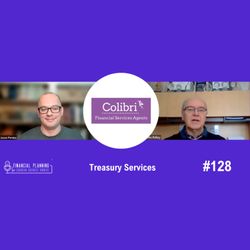
128. Treasury Services | 128
21:07||Ep. 128In this episode of Financial Planning for Canadian Business Owners, host Jason welcomes John Pelley, Co-founder and CEO of Colibri Financial Services Agents. John explains how Colibri offers fractional treasury manager services, diving into the intricacies of optimizing banking fees, loan structures, and merchant services for small businesses. They discuss why typical banking relationships are suboptimal and how Colibri provides a tailored review to unlock potential savings. John shares insights on how often businesses should revisit their financial structures and provides advice for small businesses on working effectively with banks. Tune in to understand the importance of competitive banking and the benefits of outsourcing treasury services.
127. The Institute of Advanced Financial Planners | E127
20:23||Ep. 127Choosing Qualified Financial Planners: Insights from Aaron Hector, President of the IAFPIn this episode of Financial Planning for Canadian Business Owners, host Jason speaks with Aaron Hector, president of the Institute of Advanced Financial Planners (IAFP), about the importance of finding qualified financial advisors in Canada. They discuss the Registered Financial Planner (RFP) designation, the IAFP's role in credentialing and supporting financial planners, and the rigorous process required to become an RFP. The conversation also covers the benefits of working with an RFP, the IAFP's symposiums, ongoing discussions among member financial planners, and tips for selecting the right financial planner. The episode aims to guide business owners and other individuals seeking reliable financial advice.00:00 Introduction to Financial Planning for Canadian Business Owners00:22 Overview of the Institute of Advanced Financial Planners (IFP)00:45 Understanding the Registered Financial Planner (RFP) Designation02:15 Qualifications and Process to Become an RFP03:50 The Importance of Peer Review and Feedback05:57 The Role of the IFP in Supporting RFPs08:43 Benefits of Working with an RFP13:21 Tips for Selecting the Right Financial Planner19:14 Conclusion and Final Thoughts
126. FP Canada | FPCBO 126
31:00||Ep. 126Navigating Financial Planning in Canada with FP CanadaIn this episode of 'Financial Planning for Canadian Business Owners,' the focus is on finding credible financial advice. Special guest Tasha Batstone, President and CEO of FP Canada, discusses the role of FP Canada as a certifying body, emphasizing their mission to advance professional financial planning. The conversation delves into the standards and importance of the CFP designation and introduces the QAFP designation tailored for less complex financial needs. The discussion also highlights the education, certification, and ethical requirements involved in becoming a financial planner in Canada, and the stringent processes FP Canada employs to ensure public protection and professional accountability.00:00 Introduction to Financial Planning for Canadian Business Owners00:39 Finding Credible Financial Planners00:50 Profile of FP Canada02:15 Importance of the CFP Standard06:37 Path to Becoming a CFP14:28 The QAFP Designation22:01 Accountability and Enforcement in Financial Planning28:46 Why Work with a CFP Professional?30:05 Conclusion and Final Thoughts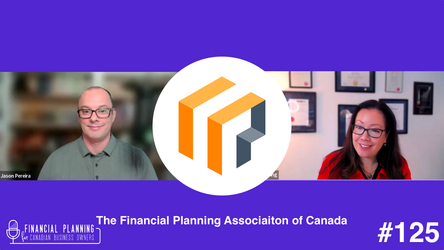
125. The Financial Planning Association of Canada | E125
27:56||Ep. 125Elevating Financial Planning Standards: An In-Depth Look at FPAC with Julia ChungIn this episode of Financial Planning for Canadian Business Owners, host Jason Pereira delves into the importance of seeking high-quality financial advice. He is joined by Julia Chung, the chairperson of the Financial Planning Association of Canada (FPAC), to discuss the goals and benefits of the organization. Julia elaborates on FPAC's commitment to advancing financial planning as a profession through education, community support, and advocacy for fiduciary standards. They explore membership requirements, the value of a psychologically safe professional community, and FPAC's role in elevating the industry. The episode concludes with guidance on seeking financial planning services and the significance of choosing a true financial planner.00:00 Introduction to Financial Planning for Canadian Business Owners01:05 Meet Julia Chung: Chairperson of FPAC04:18 The Importance of Fiduciary Standards07:12 FPAC's Vision and Membership13:01 The Role of Financial Planners in Clients' Lives19:56 FPAC's Community and Educational Resources25:01 Finding the Right Financial Planner27:12 Conclusion and Call to Action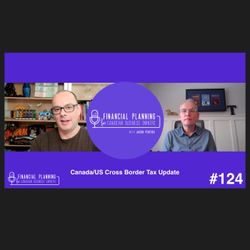
123. Cross Border Tax Update | E124
19:24||Ep. 123Unlocking Insights: Expert Tips on Career Growth & InnovationIn this episode, we explore critical insights from industry experts on how to supercharge your career and drive innovation. Key topics include strategies for effective leadership, fostering creativity within your team, and the importance of continuous learning. The discussion also highlights personal anecdotes and practical advice on navigating challenges in professional environments. Listeners will gain valuable lessons to enhance their career trajectory and embrace innovative thinking in their daily work life.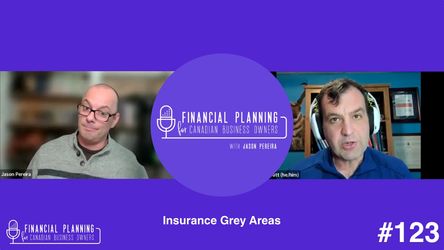
123. Insurance Grey Areas | E123
40:40||Ep. 123avigating Gray Areas in Insurance and Tax Law In this episode, host Jason Pereira, alongside guest Jason Watt, embarks on an in-depth discussion about the gray areas in insurance and tax law that Canadian business owners need to be aware of. They explore complex issues surrounding the Income Tax Act’s treatment of insurance, the potential risks involved with current sales tactics, and the specifics regarding corporate-owned insurance and individual policies. They discuss critical illness insurance, the implications of using corporate assets for personal loans, the nuances of the Capital Dividend Account (CDA), the mechanics of health spending accounts, and group benefits. They also touch upon the responsibilities and potential liabilities for insurance agents and financial planners. This episode aims to provide clarity and caution on often misunderstood and convoluted topics in the insurance field. 00:00 Introduction to Financial Planning for Canadian Business Owners 00:11 Gray Areas in Insurance and Tax Law 01:04 Historical Context of Insurance in the Income Tax Act 02:01 Critical Illness Insurance and Tax Code Gaps 02:59 Taxation of Corporate-Owned Insurance 05:06 Complexities of Borrowing Against Insurance Policies 10:45 Offshore Insurance Arrangements 13:56 Capital Dividend Account (CDA) Explained 17:05 Critical Illness Insurance with Return of Premium 20:43 Understanding Actuarial Valuation for ROP 21:06 Critical Illness Insurance: Real-Life Scenarios 21:56 Tax Implications and Full Disclosure 24:21 Group Benefits: Tax Outcomes and Gray Areas 29:14 Health Spending Accounts: Rules and Risks 33:43 Shareholder Benefits and Tax Risks 37:49 Agent's Obligations and Client Protection 41:52 CRA's Response and Tax Court Realities 45:11 Conclusion and Final ThoughtsResources Mentioned:Facebook – Jason Pereira's FacebookLinkedIn – Jason Pereira's LinkedInWoodgate.com – Sponsor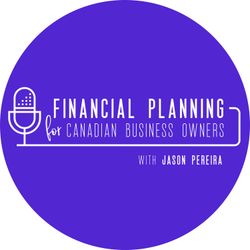
122. Health Spending Accounts | E122
30:06||Ep. 122Exploring Defined Contribution Health Plans with Steve McEwenIn this episode of 'Financial Planning for Canadian Business Owners,' host Jason Pereira welcomes Steve McEwen from My HSA to discuss defined contribution benefits programs, specifically Health Spending Accounts (HSAs) in Canada. They delve into the differences between traditional benefits programs and HSAs, the flexibility and advantages of HSAs, and the insurance options that can be layered with these accounts. McEwen provides insights on setup, costs, and the use of technology to manage claims, fraud prevention, and the overall benefits for both employers and employees.00:00 Introduction to Financial Planning for Canadian Business Owners00:25 Understanding Health Spending Accounts (HSAs)01:39 Comparing HSAs to Traditional Benefits Programs04:34 Catastrophic Insurance and Additional Coverage Options07:52 Privacy and Legal Considerations for Employers10:39 Setting Up and Administering HSAs17:14 Cost and Tax Implications of HSAs23:37 Employee Experience and Fraud Prevention28:54 Conclusion and Final Thoughts